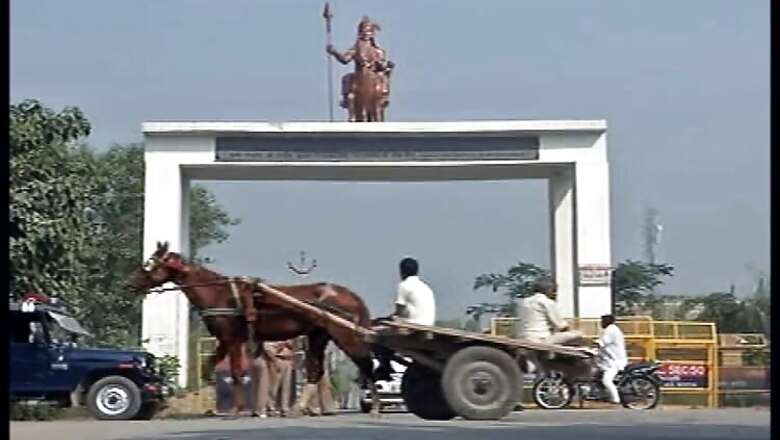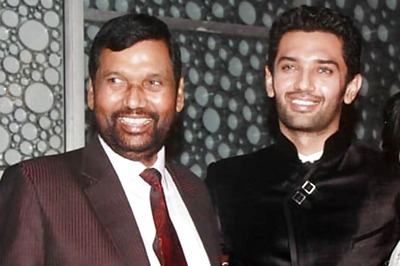
views
Come election season (which is very much like the great Indian festivals – one follows another, there are big ones and small ones) and the political class has the unique ability to bring intensely emotive issues to the fore. These developments have the potential to stir up strong sentiments that leave people and societies divided, further accentuate the 'we' and 'they' feeling and conveniently side-step the real 'bread and butter' issues that are critical to the life and living of common people.
The developments in the run up to the Bihar elections are no exception. They in fact prove the time tested strategy adopted by political leaders to whip up sentiments and excite passions and thus further stoke the simmering discontent and social divisions. The 'Maut ka Saudagar' comment, the 'Shehzaade' characterization, the 'Nikammah' insinuation and the 'Neech Rajneeti' charge have all occupied the 'centre-stage' of the electoral debate, often side-stepping common people related issues. This has been the sad tragedy that has often overtaken the electoral debate in this country. Such 'well planned' comments and 'carefully articulated' repartees often vitiate the social atmosphere and make the debate intensely acrimonious, patently personal and leave at the end of the day, a divide in the society and among people which has long term ramifications. For short term petty political electoral gain one sacrifices long term stability, peace and unity in society. For the political class of course, the long term consequences are too distant to worry about.
The 'beef controversy', its many twists and turns, is a classic example of the way an issue has been manipulated to gain maximum short term political/electoral mileage with clearly disastrous long term consequences. The killing of an elderly person in Dadri on the suspicion of storing beef at his residence, was by itself an unpardonable act triggered off by a 'carnival of hate and suspicion' that has been assiduously cultivated by some segments in society to create further social schisms and 'celebrate' their 'love for intolerance and social divide'. 'Social inclusiveness' is often considered the hallmark of plural societies like the one we have. Those in position of power and responsibility were expected to consciously and carefully build the social fabric of 'inclusion'. Across the political spectrum, political actors have failed to contribute to this task when they had the opportunity. Horrific incidents like the one at Dadri, are a sad commentary on the callousness and lack of social sensitivity displayed by political parties across the political spectrum. A natural corollary is the 'carnival of hate' one referred to earlier. Hate spawns further hate, suspicion gives room for even greater suspicion until the spiral spins out of control. When 'Dadri' happened, one expected the political leadership to speak with caution and statesmanship rather than seek immediate petty political mileage. But then….it was election time and it was difficult to expect politicians not to whip up emotions and public sentiments on this socially explosive issue. The 'sparring knives' were immediately drawn….'Dadri' was portrayed as a classic case of minority insecurity…..others went on the minority appeasement route…yet others spoke of the fear psychosis that the episode created…..All comments aimed at furthering the social divide….very few thought it prudent to apply the 'balm of unity' and 'bringing people together' rather than 'separating people even further'. Reports emerging from Dadri clearly indicate the sad 'divide' in the region that the incident has created and in its aftermath the social wedge has only got heightened leading to even greater social and communal tensions.
As it was election season, campaign managers jumped into the fray and had a heyday with their take on the events. When one political leader spoke in jest (by his own admission) of beef eating not being anti-Hindu, the opponents had a field day. No one paused for a moment to think of the implications of allowing such a debate to occupy centre-stage. The 'blame game' was the convenient way out whereas the need of the hour was to 'bind and bond' rather than 'break and breach'. Allowing emotive issues that have the potential to flare up communal passions, accentuate caste based rivalries and escalate local tensions to be the focal point of electoral campaigns and public debates becomes a convenient way to place on the back-burner vital issues of day to day life that are critical concerns of common people.
Over the last few decades, survey after survey has found that when voters were asked to identify what was the most important concern for them, invariably issues linked to development and providing for their basic needs topped their agenda. 'Vikas' as perceived by common people as improving their lives and conditions of living at the personal, local and regional level appeared to be their priority. This aspiration and expectation has often been the slogan that political parties have employed as part of their political rhetoric. It has often not translated itself into electoral support in view of the yawning gap between promise and performance…expectation and experience…rhetoric and reality. Even in the current Bihar elections, all opinion surveys have indicated that the voters in the state are keen that political parties and those who come to power focus on issues of development. There may be variance in the expectations of the rural voter and the urban resident or between those with access to higher education and those without. Past elections have also found that when a political party and/or its leadership are able to convincingly portray its development agenda not merely in terms of promises but through a conscious and sincere effort at its implementation, they have been able to garner votes. Even in the current elections in Bihar, the voter appears to be assessing the alternative developmental models and more importantly their own experience of its implementation as being projected by Narendra Modi and Nitish Kumar. Given the intensity of this contest and also to escape some of the inconveniences caused by the gulf between the dream being sold and the reality being experienced, emotive issues offer a convenient opportunity to divert issues away from what common people want a focus on and thus steer the debate away in a different direction.
An analysis of electoral verdicts would indicate that they have a clear stamp of popular endorsement of the agenda portrayed by a political party and its leadership and the people’s faith in their capacity and intent to implement the same. Those who take to the route of stirring up emotional issues and making them the mainstay of their campaign may at times have secured short term political gain but have failed the credibility test in the long run. The tragedy is that in that long run, parties and their leaders would not merely have dented their own credibility but more seriously have contributed to nurturing an atmosphere of mistrust, suspicion and divisiveness. Parties and their leaders would do well to remember that politics is not about a 100 meter race but a 5 kilometer marathon.

















Comments
0 comment